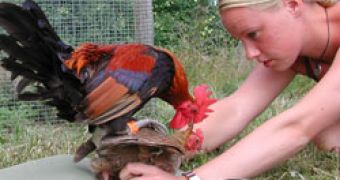Hens mate in the morning in male-dominated groups of chickens to avoid an evening of "sexual harassment" from amorous cockerels, according to a new research.
People say that birds - and especially chickens - generally have little intelligence. But researchers have found that hens juggle sexually with the males at their wish, in order to ensure that the best males father their offspring.
The research made by Dr Tommaso Pizzari of the Department of Zoology at Oxford University and Dr Hanne L?vlie of the University of Stockholm, revealed that in female-dominated groups, where sexual harassment was lower and the females could easily avoid unwanted males, hens were sexually receptive in the evening when in both sexes the fertility is the highest.
But in groups which were largely dominated by males, hens mated with desired males in the morning and then they were sexually unreceptive in the evening, keeping off the unwanted males and avoiding the sexual harassment from cockerel gangs.
This is the first study revealing sex behavior change in female birds, according to their social environment. The research was made in a free-ranging feral population of chickens at the Tovetorp research station (Sweden).
These chickens are used to the human presence, but they behave rather like wild birds. The population was assigned into groups with various sex ratios, from female-dominated groups (a minimum ratio of 2 males:8 females) to male-dominated groups (a maximum ratio of 6 males: 4 females). "What we found was that females were exposed to more intense sexual harassment in groups with more males. In these groups females solicit sex early in the morning and avoid males in the evening. This 'plasticity' in sexual behavior may enable females to reduce the cost of mating while maintaining some control over paternity", Pizzari said.
The majority of the researches on sexual selection neglect the fact that the fitness trade of mating may shift significantly in a short timescale, for example over a day.
This research reveals that the mating behavior can change at a daily level, and it also provides new data on the battle of the sexes and sexual selection.

 14 DAY TRIAL //
14 DAY TRIAL //